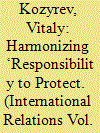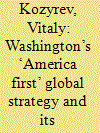| Srl | Item |
| 1 |
ID:
068454


|
|
|
| 2 |
ID:
147704


|
|
|
|
|
| Summary/Abstract |
This article examines the recent evolution of China’s policies toward the Responsibility to Protect (R2P) concept in the context of a changing international environment. As an example of an emerging ‘non-Western’ alternative to the existing normative consensus, the Chinese perception of the norm reflects the nature of the ongoing new East–West divide and is derived from Beijing’s new vision of a future world order and China’s role in it. In 2001–2011, China supported R2P as a new mechanism to revise Western practices of humanitarian interventionism and to contribute to a changing multilateral global international legal order exemplifying China’s new status as a responsible ‘global citizen’. When the R2P norm was politicized by the West as part of its global democratic interventionist policies of 2005–2014, China’s predominantly globalist vision of the international rule of law was replaced by its predominantly security-driven approach. This perspective, while recognizing the ongoing globalization of sovereignty, calls for a ‘right balance between justice and interest’ by the international community and denies the traditional Western leadership in the norm-making process. The Communist Party of China (CPC) leaders believe that the future evolution of the R2P concept should meet China’s strategic interests, including its global order-forming and institution-building initiatives. Efforts to operationalize the R2P norm will have to take this factor into account.
|
|
|
|
|
|
|
|
|
|
|
|
|
|
|
|
| 3 |
ID:
170690


|
|
|
|
|
| Summary/Abstract |
The article explores America’s evolving policy towards BRICS in the context of the Trump administration’s new ‘America First’ global strategy. Even though the BRICS grouping has not become an anti-systemic or anti-liberal force, its attempts to form an alternative centre of global power has prompted the US to manage multipolarity. The Trump administration has continued America’s previous policies of hedging potential BRICS consolidation and enhancing its regional engagement in the era of sovereignty revivalism and deglobalisation. To preserve its group identity, the BRICS needs to secure each country’s coordinated development capabilities and retain the group’s common economic, political, and security agendas.
|
|
|
|
|
|
|
|
|
|
|
|
|
|
|
|